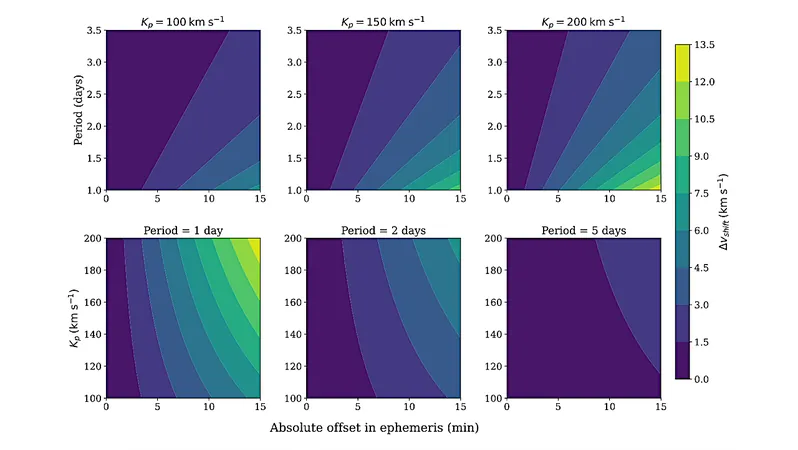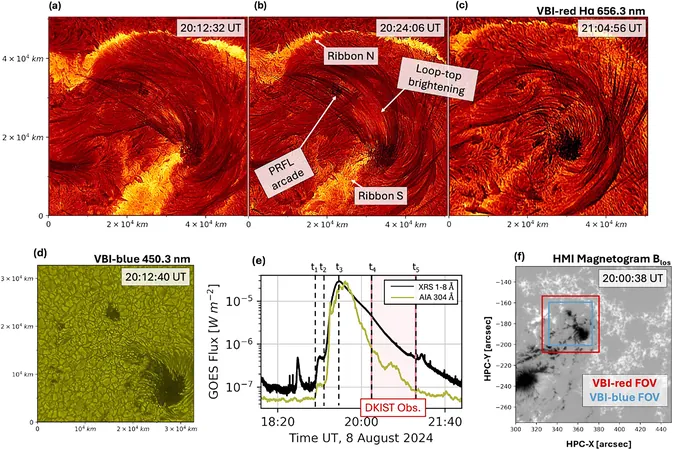
Revealing the Hidden Impact of Orbital Errors on Exoplanet Spectra
2025-07-31
Author: Siti
Understanding Exoplanet Atmospheres Through Spectroscopy
High-resolution spectroscopy (HRS) is a game-changer in our quest to decode the secrets of exoplanet atmospheres. By meticulously analyzing the light from these distant worlds, scientists can unveil the intricate details of their chemical compositions, temperature variations, and atmospheric dynamics.
The Problem with Orbital Parameter Offsets
Yet, there's a catch! Small errors in the orbital parameters of exoplanets—like transit midpoints and eccentricity—can significantly skew the results of HRS analyses. A recent study set out to explore just how these inaccuracies could affect our observations.
Simulating Spectroscopy to Uncover the Truth
Researchers conducted simulations of HRS observations during an exoplanet's transit, focusing on how different offsets in transit midpoint and eccentricity alter the expected spectra. By deriving specific analytical equations, they linked these offsets directly to shifted velocities, enabling them to compare these with the velocities observed in their simulated HRS data.
The Case of WASP-76b: A Closer Look
To highlight their findings, the team examined the ultra-hot Jupiter WASP-76b, analyzing shifts in its spectral velocities using both prior and newly recorded transit times. They discovered that even transit midpoint errors of just a few minutes, combined with an eccentricity offset of around 0.1, can lead to dramatic velocity shifts, on the order of several kilometers per second.
Consequences for Exoplanet Wind Measurements
These uncertainties are no small matter; they pose a risk of conflating wind measurements derived from HRS. This revelation underscores the critical need for precision in our orbital parameter measurements if we hope to accurately understand the intricate atmospheres of exoplanets.
Leading Voices in Exoplanet Research
The research team, including experts like Yasmine J. Meziani and Ray Jayawardhana, has shed light on an area that could redefine how we interpret exoplanet data. Their work serves as a timely reminder that even the smallest oversight in precision can have far-reaching consequences in the realm of astrophysics.




 Brasil (PT)
Brasil (PT)
 Canada (EN)
Canada (EN)
 Chile (ES)
Chile (ES)
 Česko (CS)
Česko (CS)
 대한민국 (KO)
대한민국 (KO)
 España (ES)
España (ES)
 France (FR)
France (FR)
 Hong Kong (EN)
Hong Kong (EN)
 Italia (IT)
Italia (IT)
 日本 (JA)
日本 (JA)
 Magyarország (HU)
Magyarország (HU)
 Norge (NO)
Norge (NO)
 Polska (PL)
Polska (PL)
 Schweiz (DE)
Schweiz (DE)
 Singapore (EN)
Singapore (EN)
 Sverige (SV)
Sverige (SV)
 Suomi (FI)
Suomi (FI)
 Türkiye (TR)
Türkiye (TR)
 الإمارات العربية المتحدة (AR)
الإمارات العربية المتحدة (AR)